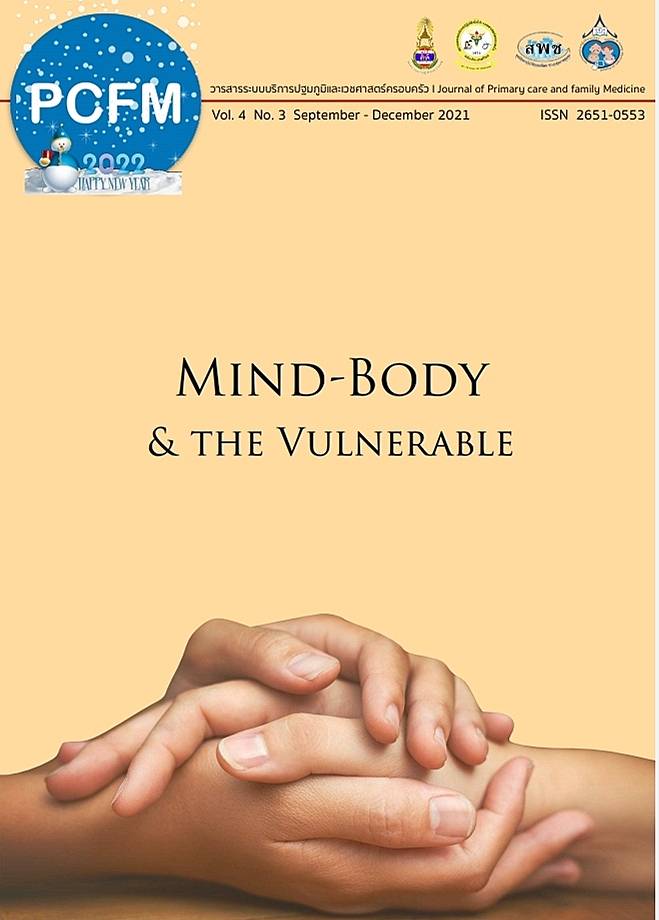การบำบัดทางความคิดและพฤติกรรมในหน่วยบริการปฐมภูมิ
Main Article Content
บทคัดย่อ
การทำจิตบำบัดความคิดและพฤติกรรม (Cognitive behavioral therapy) เป็นจิตบำบัดที่มีประสิทธิภาพในโรคจิตเวชหลายโรคและสามารถนำมาใช้ปรับพฤติกรรมสุขภาพในผู้ป่วยโรคเรื้อรังได้ จิตบำบัดความคิดและพฤติกรรมมีจุดเด่น คือ มีโครงสร้างชัดเจน ระยะเวลาสั้นและมีประสิทธิภาพในหน่วยบริการปฐมภูมิ ในประเทศไทยยังขาดแคลนบุคลากรด้านสุขภาพจิต ดังนั้นทีมสหวิชาชีพสามารถประยุกต์การทำจิตบำบัดความคิดและพฤติกรรมเพื่อใช้ดูแลผู้ป่วยในหน่วยบริการปฐมภูมิได้ บทความนี้จึงมีวัตถุประสงค์เพื่อสรุปเนื้อหาในการทำจิตบำบัดความคิดและพฤติกรรม เพื่อจะได้เป็นประโยชน์ต่อทีมสหวิชาชีพในการนำไปประยุกต์ใช้กับเวชปฏิบัติในชุมชนต่อไป
จิตบำบัดความคิดและพฤติกรรม กล่าวถึงการที่มนุษย์เผชิญกับเหตุการณ์ในชีวิตจะเกิดความคิดอัตโนมัติ เกิดอารมณ์ พฤติกรรม และอาการทางร่างกายตามมา ขั้นตอนเริ่มต้นจากสร้างความสัมพันธ์ที่ดีกับผู้ป่วย ตั้งเป้าหมายในการรักษา ค้นหาความคิดอัตโนมัติด้านลบ ทำให้ผู้ป่วยเห็นถึงด้านบวก ส่งเสริมให้เกิดการเปลี่ยนแปลงความคิดและพฤติกรรมระหว่างการทำจิตบำบัดและการให้การบ้าน สิ่งสำคัญในการบำบัดทุกครั้งคือช่วยให้ผู้ป่วยตอบสนองต่อความคิดที่ไม่ถูกต้องหรือไม่มีประโยชน์ โดยใช้เทคนิคความคิดและเทคนิคพฤติกรรม ถ้าผู้ป่วยสามารถสังเกตความคิดอัตโนมัติด้านลบที่เกิดขึ้น จะสามารถประเมินความเที่ยงตรงของความคิดได้ และเมื่อสิ้นสุดการรักษาเป้าหมายคือให้ผู้ป่วยเป็นผู้บำบัดของตนเองได้
Article Details
เนื้อหาและข้อมูลในบทความที่ลงตีพิมพ์ในวารสาร PCFM ถือเป็นข้อคิดเห็นและความรับผิดชอบของผู้เขียนบทความโดยตรง ซึ่งกองบรรณาธิการวารสารไม่จำเป็นต้องเห็นด้วยหรือร่วมรับผิดชอบใด ๆ
บทความ ข้อมูล เนื้อหา รูปภาพ ฯลฯ ที่ได้รับการตีพิมพ์ลงในวารสาร PCFM ถือเป็นลิขสิทธิ์ของวารสาร PCFM หากบุคคลหรือหน่วยงานใดต้องการนำทั้งหมดหรือส่วนหนึ่งส่วนใดไปเผยแพร่ต่อหรือเพื่อกระทำการใด ๆ จะต้องได้รับอนุญาตเป็นลายลักษณ์อักษรจากวารสาร PCFM ก่อนเท่านั้น
เอกสารอ้างอิง
2. Serrano-Blanco A, Palao DJ, Luciano JV, Pinto-Meza A, Luján L, Fernández A, et al. Prevalence of mental disorders in primary care: results from the diagnosis and treatment of mental disorders in primary care study (DASMAP). Soc Psychiatry Psychiatr Epidemiol. 2010;45(2):201–10.
3. Sukhato K. The Treatment Options for Minor Depression In Primary Care: Systematic Review. Ramathibodi Med J. 2010 Sep 24;33(3):160–6.
4. Zhang A, Borhneimer LA, Weaver A, Franklin C, Hai AH, Guz S, et al. Cognitive behavioral therapy for primary care depression and anxiety: a secondary meta-analytic review using robust variance estimation in meta-regression. J Behav Med. 2019 Dec 1;42(6):1117–41.
5. Beck JS, Beck AT. Cognitive behavior therapy : basics and beyond. New York, NY: The Guilford Press; 2011.
6. Hofmann SG, Asnaani A, Vonk IJJ, Sawyer AT, Fang A. The Efficacy of Cognitive Behavioral Therapy: A Review of Meta-analyses. Cogn Ther Res. 2012 Oct 1;36(5):427–40.
7. ณัทธร พิทยรัตน์เสถียร. การบำบัดผู้ป่วยโรคซึมเศร้าโดยเทคนิคการปรับเปลี่ยนความคิดและพฤติกรรม (Cognitive Behavior Therapy:CBT) [Internet]. [cited 2021 Mar 5]. Available from: https://www.thaidepression.com/www/56/CBTdepression.pdf
8. Kennerley H, Kirk J, Westbrook D, Oxford Cognitive Therapy Centre. An introduction to cognitive behaviour therapy : skills & applications. 2017.
9. Stein MB, Sareen J. CLINICAL PRACTICE. Generalized Anxiety Disorder. N Engl J Med. 2015 Nov 19;373(21):2059–68.
10. Otte C, Gold SM, Penninx BW, Pariante CM, Etkin A, Fava M, et al. Major depressive disorder. Nat Rev Dis Primer. 2016 Sep 15;2(1):1–20.
11. Weisberg RB, Magidson JF. Integrating Cognitive Behavioral Therapy Into Primary Care Settings. Cogn Behav Pract. 2014 Aug 1;21(3):247–51.
12. Bond FW, Dryden W. Handbook of brief cognitive behaviour therapy. Chichester, West Sussex; Hoboken, NJ: Wiley; 2004.
13. Jeffrey A. Cully, Andra L. Teten. A Therapist’s Guide to Brief Cognitive Behavioral Therapy [Internet]. Houston: Department of Veterans Affairs, South Central Mental Illness Research, Education, and Clinical Center (MIRECC); 2008 [cited 2021 Mar 11]. Available from: https://www.mirecc.va.gov/visn16/docs/therapists_guide_to_brief_cbtmanual.pdf


